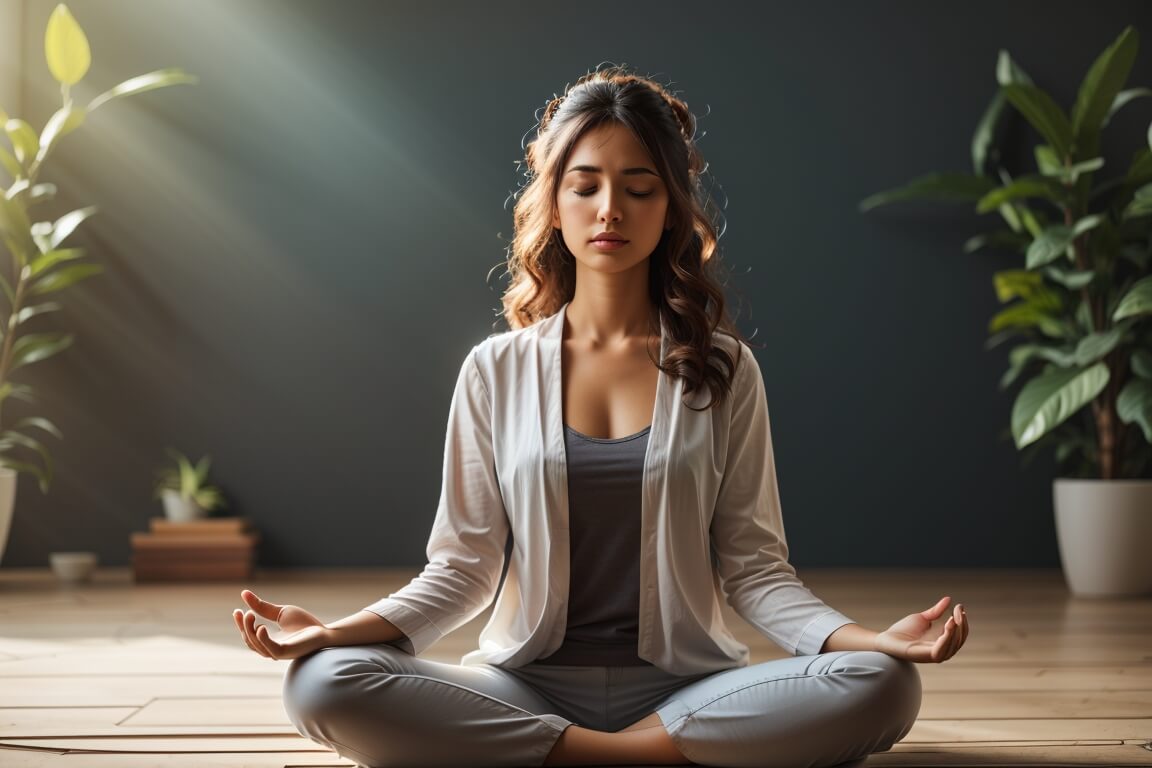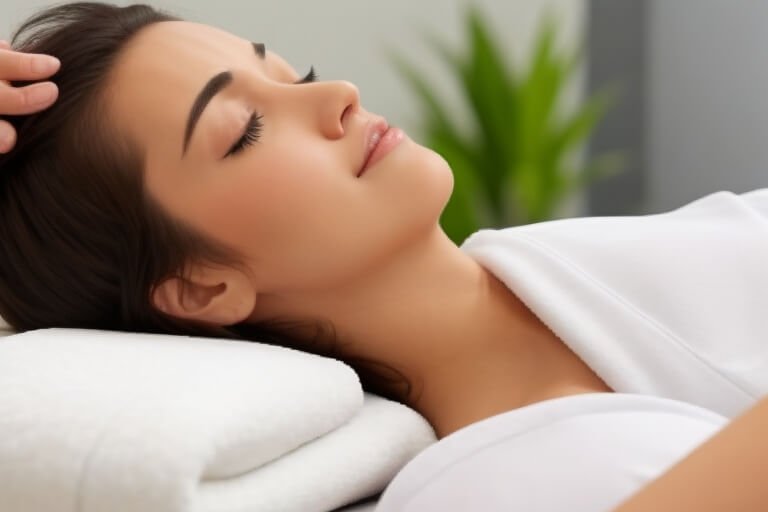Stress is a common problem that affects many people in different ways. It can cause physical and mental health issues, such as headaches, insomnia, anxiety, depression, and more. Stress can also interfere with your productivity, relationships, and happiness.
But stress is not inevitable. You can learn to manage it and reduce its negative impact on your life. One of the most effective ways to combat stress is to practice relaxation techniques. Relaxation techniques are methods that help you calm your mind and body, and restore your balance and well-being.
In this article, we will explore seven relaxation techniques that you can use to combat stress and improve your quality of life. These techniques are easy to learn and practice, and can be done anywhere and anytime. They are:
- Deep breathing
- Progressive muscle relaxation
- Meditation
- Yoga
- Tai chi
- Massage
- Aromatherapy
Let’s take a closer look at each of these techniques and how they can help you combat stress.
How Deep Breathing Can Help You Combat Stress

Deep breathing is one of the simplest and most powerful relaxation techniques. It involves taking slow, deep, and rhythmic breaths through your nose, filling your lungs with air, and exhaling through your mouth.
Deep breathing has many benefits for your health and well-being. It can:
- Lower your heart rate and blood pressure
- Reduce muscle tension and pain
- Improve your oxygen delivery and blood circulation
- Enhance your immune system and digestion
- Boost your mood and energy levels
- Clear your mind and focus
To practice deep breathing, you can follow these steps:
- Find a comfortable position, either sitting or lying down.
- Place one hand on your chest and the other on your abdomen.
- Breathe in slowly through your nose, feeling your abdomen rise as you inhale.
- Breathe out slowly through your mouth, feeling your abdomen fall as you exhale.
- Repeat this process for several minutes, or as long as you feel comfortable.
You can practice deep breathing anytime you feel stressed, anxious, or overwhelmed. You can also use it as a daily routine to start or end your day with a sense of calmness and relaxation.
How Progressive Muscle Relaxation Can Help You Combat Stress

Progressive muscle relaxation is another relaxation technique that can help you combat stress. It involves tensing and relaxing different muscle groups in your body, one by one, from head to toe.
Progressive muscle relaxation can help you:
- Release physical tension and stiffness
- Relieve pain and discomfort
- Improve your posture and flexibility
- Increase your awareness of your body sensations
- Relax your mind and emotions
To practice progressive muscle relaxation, you can follow these steps:
- Find a comfortable position, either sitting or lying down.
- Close your eyes and take a few deep breaths.
- Start with your feet and toes. Tense them as hard as you can for about five seconds, then relax them completely.
- Move up to your lower legs, then your upper legs, repeating the same process of tensing and relaxing each muscle group for about five seconds.
- Continue with your hips, buttocks, abdomen, chest, back, shoulders, arms, hands, neck, face, and head, until you have tensed and relaxed every part of your body.
- Take a few more deep breaths and enjoy the feeling of relaxation throughout your body.
You can practice progressive muscle relaxation whenever you feel tense or stressed. You can also use it as a regular exercise to prevent stress buildup and maintain a relaxed state of mind and body.
How Meditation Can Help You Combat Stress
Meditation is another relaxation technique that can help you combat stress. It involves focusing your attention on a single object, such as your breath, a word, a sound, or an image, while letting go of any distracting thoughts or feelings.
Meditation can help you:
- Calm your nervous system and reduce stress hormones
- Increase your brain activity and creativity
- Enhance your memory and concentration
- Improve your self-esteem and confidence
- Cultivate positive emotions and attitudes
- Achieve a sense of inner peace and happiness
To practice meditation, you can follow these steps:
- Find a quiet place where you won’t be disturbed.
- Choose a comfortable position, either sitting or lying down.
- Close your eyes and take a few deep breaths.
- Choose an object of focus, such as your breath, a word, a sound, or an image.
- Bring your attention to the object of focus, without judging or analyzing it.
- Whenever you notice that your mind wanders away from the object of focus, gently bring it back to it.
- Continue this process for as long as you wish.
You can practice meditation anytime you need to relax or clear your mind. You can also use it as a daily habit to improve your mental and emotional well-being.
How Yoga Can Help You Combat Stress

Yoga is another relaxation technique that can help you combat stress. It is a physical, mental, and spiritual practice that combines breathing exercises, body postures, and meditation.
Yoga can help you:
- Strengthen your muscles and bones
- Improve your balance and coordination
- Enhance your flexibility and mobility
- Regulate your hormones and metabolism
- Detoxify your organs and tissues
- Harmonize your mind, body, and spirit
To practice yoga, you can follow these steps:
- Find a suitable space where you have enough room to move.
- Wear comfortable clothes that allow you to stretch and breathe.
- Choose a yoga style that suits your level and goals, such as hatha, vinyasa, bikram, or ashtanga.
- Follow a sequence of yoga poses, or asanas, that work on different parts of your body, such as sun salutations, warrior poses, triangle poses, or bridge poses.
- Coordinate your breath with your movements, inhaling and exhaling smoothly and deeply.
- End your session with a relaxation pose, such as corpse pose, or savasana.
You can practice yoga anytime you want to exercise or relax. You can also use it as a regular discipline to enhance your physical and mental health.
How Tai Chi Can Help You Combat Stress
Tai chi is another relaxation technique that can help you combat stress. It is a martial art that involves performing slow, graceful, and fluid movements that follow a specific pattern or form.
Tai chi can help you:
- Improve your posture and alignment
- Increase your blood flow and circulation
- Boost your immune system and vitality
- Reduce inflammation and pain
- Balance your emotions and mood
- Develop your concentration and awareness
To practice tai chi, you can follow these steps:
- Find a spacious and peaceful place where you can move freely.
- Wear loose and comfortable clothes that allow you to breathe and sweat.
- Choose a tai chi style that matches your preferences and abilities, such as yang, chen, wu, or sun.
- Learn the basic principles and techniques of tai chi, such as rooting, centering, sinking, relaxing, and flowing.
- Follow a sequence of tai chi movements, or forms, that work on different aspects of your energy, or qi, such as opening, closing, rising, falling, advancing, retreating, or turning.
- Coordinate your breath with your movements, inhaling and exhaling naturally and evenly.
You can practice tai chi anytime you want to move or meditate. You can also use it as a lifelong practice to cultivate your health and harmony.
How Massage Can Help You Combat Stress

Massage is another relaxation technique that can help you combat stress. It is a manual therapy that involves applying pressure, friction, vibration, or kneading to various parts of your body.
Massage can help you:
- Relax your muscles and joints
- Stimulate your nerves and reflexes
- Release endorphins and serotonin
- Ease tension and fatigue
- Heal injuries and wounds
- Restore function and movement
To practice massage, you can follow these steps:
- Find a comfortable place where you can lie down or sit.
- Use oil, lotion, cream, or gel to lubricate your skin and reduce friction.
- Choose a massage technique that targets your specific needs and goals, such as Swedish massage (for general relaxation), deep tissue massage (for chronic pain), sports massage (for athletic performance), or reflexology (for organ health).
- Apply gentle to firm pressure to different areas of your body using your hands, fingers, thumbs, elbows, forearms, or feet.
- Move along the direction of the muscle fibers or the blood flow using strokes such as gliding (for spreading the oil), kneading (for squeezing the tissue), tapping (for stimulating the nerves), or rubbing (for creating heat).
- Adjust the pressure and speed according to your comfort level and feedback.
You can practice massage anytime you want to pamper yourself or relieve stress. You can also use it as a regular treatment to improve your overall well-being.
How Aromatherapy Can Help You Combat Stress
Aromatherapy is another relaxation technique that can help you combat stress. It is the use of natural oils extracted from plants to enhance your physical and psychological health.
Aromatherapy can help you:
- Alter your brain chemistry and mood
- Influence your hormones and emotions
- Support your immune system and healing
- Purify your air and environment
- Beautify your skin and hair
- Relax your senses and spirit
To practice aromatherapy, you can follow these steps:
- Find a safe place where you can enjoy the aroma without any distractions or hazards.
- Choose an essential oil that suits your purpose and preference, such as lavender
(for relaxation and stress relief), peppermint (for energy and alertness), or lemon (for cleansing and uplifting). 3. Use a diffuser, inhaler, spray, or candle to disperse the oil into the air and breathe it in. 4. Alternatively, use a carrier oil, such as almond, coconut, or jojoba, to dilute the essential oil and apply it to your skin, such as your temples, wrists, or feet. 5. You can also add a few drops of essential oil to your bath water, shampoo, lotion, or massage oil for a more immersive experience.
You can practice aromatherapy anytime you want to enhance your mood or atmosphere. You can also use it as a regular therapy to support your holistic health.
Conclusion
Stress is a common problem that can affect your health and happiness. But you can combat stress and improve your quality of life by practicing relaxation techniques. Relaxation techniques are methods that help you calm your mind and body, and restore your balance and well-being.
In this article, we have explored seven relaxation techniques that you can use to combat stress. They are:
- Deep breathing
- Progressive muscle relaxation
- Meditation
- Yoga
- Tai chi
- Massage
- Aromatherapy
These techniques are easy to learn and practice, and can be done anywhere and anytime. They have many benefits for your physical and mental health, such as lowering your blood pressure, reducing muscle tension, boosting your mood, enhancing your creativity, and more.
We hope that this article has inspired you to try some of these relaxation techniques and discover their positive effects on your life. Remember that stress is not inevitable. You can learn to manage it and reduce its negative impact on your life.
Thank you for reading this article. We hope you enjoyed it and learned something new. Please leave us your honest feedback and suggestions in the comments section below. We would love to hear from you and improve our content. Have a wonderful day! 😊
We hope this article has been useful and informative for you. Leave your comment below and follow us on facebook and pinterest for more tips
In addition to relaxing your mind, it’s important to sleep well and have a restorative sleep for a peaceful and productive life.
